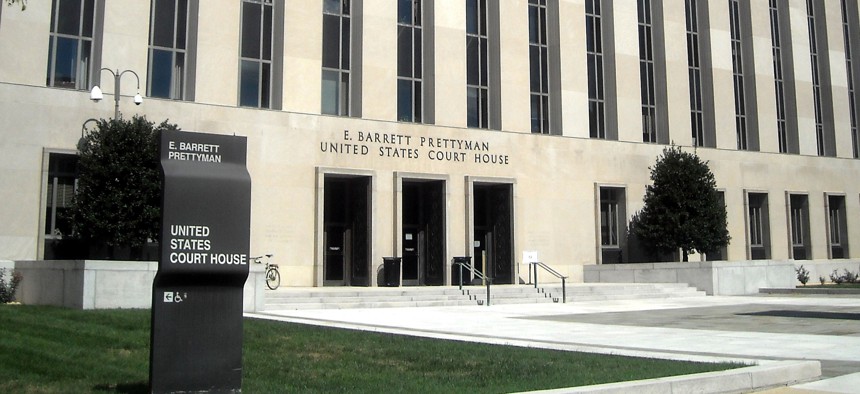
E. Barrett Prettyman Federal Courthouse in Washington, D.C. AgnosticPreachersKid / Wikimedia
The U.S. Military Held an American as an Enemy Combatant for Over a Year. Here’s What That Means.
The case could have upended the entire war on ISIS. Instead, it’s changing how we treat some detainees.
For 13 months, the U.S. military held an American citizen known only as “John Doe” in custody in Iraq as a suspected ISIS member.
The case had the potential to answer a controversial question that has bedeviled the past two administrations: Does the current congressional authorization for the use of military force cover the fight against the Islamic State?
In challenging his detention, lawyers for the man — his name is Abdulrahman Ahmad Alsheikh — argued that it does not. In a series of transfer proposals, the Justice Department sought to negotiate a final disposition that would avoid a ruling on the underlying issue.
Last week, the saga came to an end. The New York Times reports that the U.S. has released Alsheikh in Bahrain without a passport—and without a ruling from the U.S. District Court of the District of Columbia.
But Alsheikh’s case could still reverberate in the muddy world of U.S. detention authorities in the war on terror. A critical early ruling in Alsheikh’s habeas litigation allowed lawyers from the American Civil Liberties Union, or ACLU, to meet with him before even they knew his identity. Legal analysts and Alsheikh’s lawyers say that ruling would seem to establish that U.S. citizens captured on the battlefield fighting for ISIS are entitled to a lawyer.
While there is little question that the military has the authority to hold a U.S. citizen as an enemy combatant, U.S. policy on the rights of American enemy combatants has largely been decided by narrow, individual court rulings. Alsheikh’s case provides a potentially influential data point in that constellation of court-ordered rights.
“I think the access to counsel has been clarified for a citizen who is in a combat zone and ends up as a military detainee,” said Bobby Chesney, a national security law professor who worked on detention issues at the Justice Department in 2009. He called the precedent “dramatic.”
From the beginning, Alsheikh presented a difficult case for the administration. Although they were certain that he was a member of the terror group, officials believed they lacked sufficient usable evidence to try him in court. But for security reasons, they were loathe to simply release him and allow him to return to the United States.
When the capture of a U.S. citizen became public through media reporting, the American Civil Liberties Union sought to represent “John Doe” as a so-called “next friend.” The Justice Department objected, arguing that the ACLU lacked the standing to represent Doe given that it did not know who he was nor did it have a relationship with him.
But U.S. District Court Judge Tanya Chutkan was unconvinced, condemning the argument as “circular,” because the government was withholding Alsheikh’s identity while simultaneously arguing that the ACLU could not proceed anonymously.
In December, Chutkan ordered the government to provide the ACLU with unmonitored access to Alsheikh.
Anna Diakun, a lawyer with the ACLU that worked on Alsheikh’s case, said, “I think this case clearly shows that any citizen picked up in a similar situation and alleged to be a member of ISIS is entitled to due process, is entitled to an attorney—and their arguments will go before a court and the court will weigh in.”
But Chutkan left the core question of Alsheikh’s detention unanswered.
Represented by ACLU lawyers, Alsheikh challenged his detention on the basis that because ISIS is not explicitly covered under the current congressional authorization for the use of military force — a subject of intense debate across multiple administrations — he cannot legally be held as an enemy combatant.
But Chutkan never ruled on that point, amid a series of attempts by the government to avoid an adverse decision that could hamstring the interpretation used by the past two administrations to legally justify the war on ISIS. The Justice Department put forth a series of transfer proposals that the ACLU blocked, including one to Saudi Arabia, where Alsheikh holds a dual citizenship, and one to Syria, where he was initially captured.
In order to classify a person as an enemy combatant, the government must be able to show that he or she is a fighter for an enemy force with whom the U.S. is in a state of armed conflict.
Alsheikh was picked up by Syrian forces at a checkpoint as he was trying to escape Syria into Turkey in September 2017. According to the government, he identified himself as “daesh”—another word for ISIS—and he was found carrying thumb drives containing an ISIS personnel spreadsheet and “military style handbooks” about bomb building, interrogation techniques and weapons handling.
But the post-9/11 legal authorization that both Presidents Trump and Obama have used to conduct operations against ISIS does not explicitly name the terror group—only al Qaeda and “associated forces.” Both the Trump and Obama administrations have claimed that ISIS is an “associated force,” but critics of that interpretation argue that ISIS officially splintered off from al Qaeda in 2014 and therefore cannot be classified as such.
The courts have not yet weighed in on that rationale, while Congress has offered its de facto imprimatur by declining to pass a new Authorization for the Use of Military Force, or AUMF.
Despite the lengthy nature of Doe’s detention, there is little concern that his case could provide precedent for indefinite military detention of a U.S. citizen. Chutkan in November expressed alarm that “the government could snatch any U.S. citizen off the street and hold him as an enemy combatant as long as it took,” calling “that kind of unchecked power... quite frankly frightening.”
The Obama administration had embraced a model sometimes referred to as “the hybrid option” to handle similar cases. Under that rubric, an individual would be detained in military custody for an unspecified period of time and interrogated; an FBI “clean team” would then be brought in to read the individual his or her Miranda rights and kick-start a civilian prosecution.
While the Trump administration did not initiate prosecution in an Article III court, Alsheikh’s ultimate disposition was in a state of constant negotiation and litigation in civil court, largely over the slate of transfer attempts.
“Because it was never the subject of a ruling, you can’t say that the passage of all this time in any way actually blessed what [the Trump administration] were doing,” Chesney said, arguing that there is no “judicial imprimatur” on his lengthy detention.
“It’s really clear why it dragged on for so long without a ruling and none of those reasons are anything to do with blessing what’s going on. It didn’t undermine it either, but it didn’t bless it.”







